- Home
- Mark Chadbourn
Jack of Ravens kots-1
Jack of Ravens kots-1 Read online
Jack of Ravens
( Kingdom of the Serpent - 1 )
Mark Chadbourn
Mark Chadbourn
Jack of Ravens
PROLOGUE
Three women huddle in a dark place, their features swathed in shadow. They work diligently, one spinning threads, one measuring them. The third waits with a pair of shears. And as they go about their business, they sing in high, unsettling voices, of what was, of what is, and of what will be, and their songs change constantly, like the sea, like the sand on the beach.
The Daughters of the Night know this: nothing is as it seems. There are hidden patterns in the weft and weave of human existence. Only one thing can be trusted: the heart; and some threads that bind shall not be broken, however far they stretch across time or space.
Their song begins anew. The shears are poised …
Chapter One
THE GREAT DOMINIONS
1
Spectral mist drifted across the rolling grassland. The thin light of approaching dawn filtered through in shades of gold and pink, the whole world glowing as if newly formed. The only sound was the breeze; the stillness that followed a terrible storm had cupped the world in its palms.
Out of the gently shifting fog wandered Jack Churchill, as pale as a ghost, which in a way he was, hair as black as crow’s wings, a face that combined sensitivity and strength, sadness and hope in equal measure. His torn, bloodstained clothes revealed numerous minor wounds. And in his hand he loosely carried a sword that might not have been a sword at all.
He didn’t know where he was going, or from where he had come. Only one thing filled his mind: the image of a young woman with long, dark hair and a face as pale as his own; a name: Ruth; a sense of a deep and powerful love that gave meaning to his existence.
Exhaustion enveloped him, but the malaise went deeper than his weary bones; it felt as though the gentle fog had permeated his head, swaddling memories that only recently had been clear and sharp. He knew his name, that all who knew him called him Church. He recalled the basic details of his life — his work as an archaeologist, his family, his friends, his flat in South London — but the circumstances that had led him to that lonely landscape in such a dire condition were muddled and fading fast.
The grassland sloped away before him. He could smell wet vegetation, perhaps a hint of the sea.
Find a road, his subconscious told him. Hitch a lift. Get away. Get to Ruth, before it’s too late … for her, for you.
As he wrestled with his memory, he glimpsed movement in the drifting white — spectral shapes, there then gone, like circling wolves.
‘Who’s there?’
The echoes of his question were muffled by the fog, but the sound of his voice stirred something in him. He came to a halt and glanced down at the weapon in his hand. His eyes played tricks on him. Though every sensation told him he was holding a sword, for the briefest second he thought he was gripping a strange crystal formation glowing with a powerful blue light. His eyes blurred, static shimmered across his mind and then it really was a sword, the blade imprinted with strange, delicate runes, black against the silvery steel, the pommel an ornately carved dragon’s head.
The incongruity was disturbing; even more troubling was the realisation that he had not considered it unusual until now. Why did he have an ancient weapon? Why all the blood? Had he murdered someone?
His dazed incomprehension was interrupted by an inhuman roar thundering across the landscape. As the hairs prickled on the back of his neck, Church gripped the sword tightly, easily.
Whatever had made the sound was lost in the mist. An animal, Church told himself, though it sounded like no animal he had ever heard before. Uneasy, he slowly backed away from what he thought was the source of the noise. The mist was disorienting, and when the roar came again, it was unnervingly near at hand. Deep tremors accompanied it, as though an industrial machine was pounding away.
Church chose a direction at random and ran down the gradual slope, dodging gorse bushes and outcroppings of lichen-covered rock. By the time he realised he’d made the wrong choice, there were people running somewhere nearby, their fearful shouts punctuating the now-deafening roar. The ground shook so forcefully that Church could barely keep his feet.
Church had only a split second to throw himself to one side as something hurtled towards him. Crashing to the damp grass, he glimpsed a huge, dark mass that felt like a juggernaut whistling by only inches away.
A cry of terrible pain cut brutally short echoed nearby. Church’s unease turned to full-blown anxiety. An enormous shadow fell over him.
Looming above him, the top half lost in the reaches of the mist, was a giant figure that Church estimated must have been at least twenty-five feet tall. Yet it was not, by any description, a man. The legs that shook the ground were made of branches, earth, rocks, creepers and clumps of gorse. With a sound like the ground being torn open, the thing bent down rapidly and Church was confronted by a face constructed from a similar jumble of organic and inorganic matter, red eyes glowing from the depths.
He was rooted for a second too long. Fingers as strong as ironwood clamped around his chest. He felt his ribs start to crack as the giant lifted him off the ground.
Six men brandishing swords, spears and shields ran from the mist to attack the giant. Despite his pain, Church was shocked by their appearance. Five of the men had whitened hair, spiked and tied in ponytails, while the sixth wore a bronze horned helmet. They were all naked from the waist up, their torsos tattooed with blue circles and swirls above loose-fitting tartan trousers.
The warriors brutally gouged out chunks of the matter that made up the giant’s form. Roars of pain and anger followed each assault.
Church was on the verge of blacking out from the pressure on his ribs when the giant finally loosened its grip to defend itself. A voice deep inside him, calm and blue as a summer sky, told him he could launch his own attack. Extending his sword arm, Church was surprised to see the blade now limned with a thin sapphire light that occasionally became tiny dancing flames. He thought he could hear it singing, a gentle susurration that soothed him.
The giant’s red eyes glowed with the intensity of hot coals in reaction to the sword. Church lashed out at its wrist, and wood and rock showered into the air. When its grasp loosened further, Church dropped, landed on his feet and bounded away. With a fierce roar, the giant disappeared into the mist.
The warriors eyed him uneasily as they readied themselves to repel another attack.
‘Who are you?’ Church said breathlessly. ‘What’s going on here?’ His words only served to disturb them further.
The vibrations running up Church’s legs were growing stronger. He turned slowly, waiting. Hidden by the shifting grey, the giant was circling them, its attack strategy more cautious. In Church’s hand, the sword sang soothingly. Eerily, it felt as though ethereal tendrils were flowing from the hilt, easing through his skin and muscle and bone and working their way up his arm.
The roar made Church’s ears ring. An instant later, the giant hurtled out of the mist like a train. As one of the warriors raised his spear, the giant’s mighty fist propelled him through the air, turning his chest to jelly. Another fighter, stunned by the speed and ferocity of the attack, was plucked up, his head torn off with a flick of the giant’s wrist, both parts tossed carelessly aside.
The other warriors were as quick as rats. They scattered, then turned and attacked the giant savagely with fluid motions as they dodged its huge legs, but their weapons made little impact.
Church was shocked to realise that of all the remaining warriors, the giant had decided to focus on him alone. As he threw himself out of the giant’s path, one of its rushing legs
clipped his heel and sent him spinning hard into the ground.
The giant was on him instantly, its roar so loud it made his skull ache. Church reacted instinctively, though later he had the odd feeling that the sword had moved on its own. Now ablaze with blue flames, the blade swung in an arc, and when it hit the giant’s leg, there was an eruption of fire and a shower of wood, rock and soil. A loud crack signalled the breaking of what remained.
The giant teetered, then pitched forward, its shadow descending like night, talons of oak and ash lunging for Church. His sword came up, a beacon in the approaching dark. Church braced himself, and at the last moment rolled to avoid the bulk of the giant’s torso, driving the blade into its neck and up into its head.
The force of the impact threw Church back several yards, and when he finally clambered to his feet, dazed, the giant lay still. Church had a fleeting image of soil accumulating over the years and grass growing over it, until all that was left was a mound on the landscape and a distant legend about giants resting in the earth.
Church came back to reality sharply, the palpable feeling of dislocation making him queasy. The strangely dressed warriors gathered around, their expressions alternating between fear and awe.
‘Please … tell me what’s happening here,’ Church said. ‘What was that thing?’
The men looked at each other before the one in the helmet stepped forward. He was in his early twenties with strong, thoughtful features. He glanced several times at Church’s sword while he struggled to find the right words, but when he did finally speak, Church was stunned to hear sounds he had only previously heard in the sterile confines of a university lecture theatre: the Gaulish Celtic language.
Church attempted a rough translation, but only a few words were understandable. Most noticeable was the name Nuada Airgetlamh, which the young man said when he gestured hesitantly to the sword in Church’s hand; he appeared to be implying that it was the fabled weapon of the Celtic god Nuada.
Unable to comprehend what had happened to him, Church moved away from the young men and wandered down the slope until he reached a point where the dawn sun had started to burn off the mist. The green landscape reached down to a shimmering blue sea, the coast lined with thick trees. It could have been anywhere. He became aware of the sweetly fragrant air without even a hint of pollution. Few places in Britain would have such a pure atmosphere.
‘What’s happened?’ he said, disturbed.
2
The following few hours passed in a blur. Church remembered traipsing across grassland surrounded by the warriors until they came to a copse where several horses were tethered. He was helped onto the back of one and then the group set off south. Through the haze, Church realised a painful truth: there were no roads, no service stations, no towns, no villages, no hamlets, no planes passing overhead. Just an unspoiled landscape of grass, gorse bushes and trees.
3
Church woke on a rough bed of straw in a shadowy place that smelled of mud, smoke and animals. A woman in her early twenties was tending a fire in the central hearth area. Her long brown hair was plaited into pigtails and tied with ribbons, and while certainly attractive, her features had been hardened by the stresses of life. Her long dress was of the deepest green, the fabric thick to protect her from the elements. She nodded impassively to Church when she saw him looking at her and said a word of greeting, which he translated as ‘Giantkiller’.
‘Jack,’ he replied, tapping his chest. Dismissing this immediately with a shake of his head, he amended, ‘Church.’
She repeated his name hesitantly in her thick accent and then proffered, ‘Etain,’ resting her hand on her left breast.
Church began to struggle to his feet, but Etain came over quickly and respectfully pressed him back onto the straw. Cautiously, she pulled his shirt away from his shoulder to reveal some of the many small wounds that peppered his frame. She paused, uncertain, before easing the shirt off his upper arm to reveal a black, spider-like object about an inch across embedded in his flesh. It wasn’t painful; in fact the whole area was numb. Puzzled, Church moved to touch it, and as his fingers brushed it, the tiny black legs clenched and dug deeper into his skin. He jerked his hand back as if it had been burned: the thing was alive.
‘Bad,’ Etain said. ‘Poison.’
Sickened, Church examined the thing as best he could from his limited perspective. It appeared to be made of shiny metal rather than organic material, but he thought he could see a pair of eyes on the edge of the carapace. His initial reaction was to try to find some sharp implement with which to prise the creature out, but Etain saw his anxiety and placed a calming hand on the back of his own.
‘Wait,’ she said. ‘The healer will help.’ There was more, but although Church had studied the language, most of it had been in written form and Etain spoke so quickly it was difficult to draw meaning from her words.
Fighting to understand what was happening, Church struggled to his feet and pushed past the solicitous Etain to get some fresh air. He walked into a small open-air courtyard with several rooms leading off it. One contained a sump to collect rainwater; another was a larder; the rest were living quarters. The building as a whole was almost circular and constructed of stone walls with a high straw roof. Church could see other similar structures beyond.
Etain followed him curiously as he made his way out into a small street that wound around the handful of homesteads. Playing children and adults going about their business stopped to stare. As he looked around in a daze, Church thought he recognised the layout of the settlement and its position in the landscape.
He swung his arm wide in a gesture Etain could understand.
‘Cerniu,’ she said, indicating the land towards the horizon.
Church translated easily: ‘Cornwall.’ Then he pointed towards the homesteads, suddenly not wanting to hear what Etain would call them.
‘Carn Euny,’ she said.
With a shiver, Church recalled visiting the settlement while studying for his degree. All that had remained were low walls of grass-topped stone, worn down by the centuries that had passed since Carn Euny had been a thriving community. He refused to accept what the facts were asking him to consider: that somehow he was in the Iron Age, more than 2,300 years before he had been born.
In a wild panic, he ran out of the village and up onto higher ground, hoping to catch sight of a road, or a modern house, or hear the distant rumble of traffic.
Finally Etain caught up with him. His incoherent thoughts briefly coalesced when he searched her face. Was she really long-dead, and everyone she knew and loved? The thought that followed naturally hit Church hard: if she was dead, he too must be dead with her, long before he was born, lost to everyone he knew.
4
For the next three days, Church tried to rest and recuperate. His wounds were all superficial, apart from the sickening black spider that continued to burrow into his flesh whenever he made any attempt to remove it. While it did not cause any immediate pain, Church was convinced it was somehow involved in the disappearance of his memory, which still continued to fade in random patches. Etain told him bluntly that it was killing him.
On the second day, unable to restrain himself, he attempted to gouge it out with a hot knife, but only succeeded in burning his skin. The spider dug its legs so deeply into his flesh that he felt an ache at the bone.
The mysteries of his existence tormented him with unanswerable questions: how had he walked out of his modern life and into a landscape more than 2,000 years earlier? What was the black spider and where had it come from? Where had he gained the sword, which left the villagers in such awe that they refused to enter the room where it was stored? And why had he forgotten all the details of the recent past that might have explained his situation?
His own emotions see-sawed wildly: shock, anger, depression, frustration and a desperate yearning for what he had left behind. One feeling burned brighter than all the others: how much he missed Ruth Gallagher, the w
oman he loved. He remembered her pale face, her hopeful, dark eyes that hinted at internal scars, her tumbling brown hair. He remembered her cathedral-like importance in his life and that somehow they had finally come together after a period of strife; that he was bereft without her. He recalled her last, grief-stricken words: ‘I’ll love you. Always, Church. Always.’ But all other detail had faded, and he was afraid that as long as the spider continued to suck out what was important to him, it was only a matter of time until the rest of Ruth would be gone, too. In that strange place, so far from everything he knew, adrift in loneliness and confusion, that memory was the only thing that gave him the strength to continue.
Unable to make sense of anything, he found it easier to cope if he didn’t try. And so he spent his time getting to know the people who had taken him in, and sharpening his use of their language. Part of the Dumnonii tribe, they were farmers who occasionally traded the lumps of Cornish tin they found in the local streams at the nearby port of Ictis, which Church knew as the modern-day St Michael’s Mount. They were, as historical records said, friendly to strangers but fiercely combative when threatened. But though they told him much about their existence, whenever anything he felt was important came up in conversation they walked away, muttering that it was neither their place nor the time to discuss such things. It infuriated Church, but they could not be persuaded to change their views. ‘They are waiting,’ Etain told him, but for whom and for how long was never defined.
Etain was his guide, introducing him to the good-natured families who made up the settlement, with whom he would attempt to converse in the Brythonic Celtic language interspersed with untranslatable modern English words. Her nature was naturally sphinx-like and many times Church found himself using her as little more than a sounding board for his own troubled thoughts. It eased his mind somewhat and she appeared unconcerned about it, so he couldn’t see the harm. Yet he was always cautious about revealing too much of his origins for fear of disturbing the villagers; displacement in time was troubling enough for him to understand.

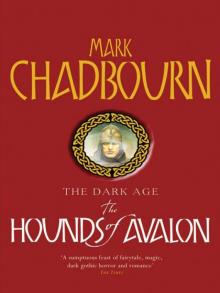 The Hounds of Avalon tda-3
The Hounds of Avalon tda-3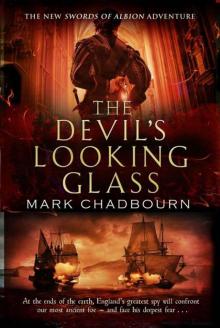 The Devil's Looking-Glass soa-3
The Devil's Looking-Glass soa-3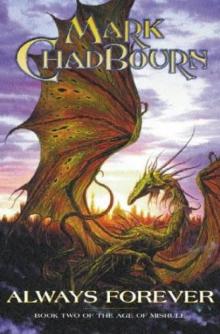 Always Forever taom-3
Always Forever taom-3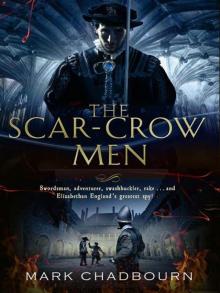 The Scar-Crow Men
The Scar-Crow Men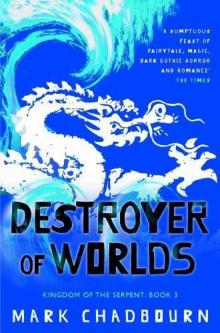 Destroyer of Worlds kots-3
Destroyer of Worlds kots-3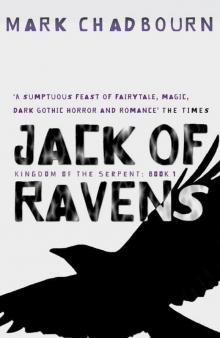 Jack of Ravens kots-1
Jack of Ravens kots-1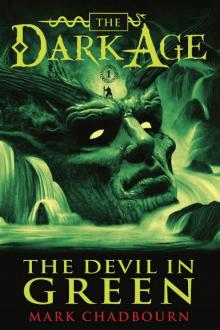 The Devil in Green
The Devil in Green World's End
World's End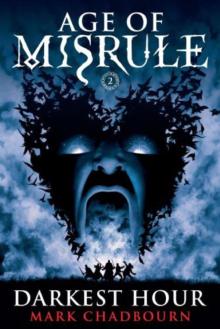 Darkest Hour (Age of Misrule, Book 2)
Darkest Hour (Age of Misrule, Book 2) Destroyer of Worlds
Destroyer of Worlds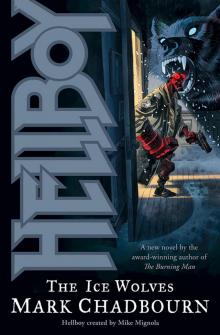 The Ice Wolves
The Ice Wolves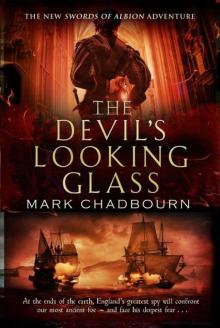 The Devil soa-3
The Devil soa-3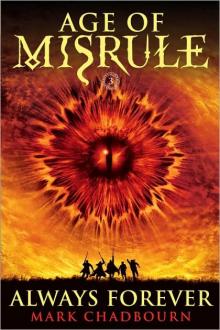 Always Forever
Always Forever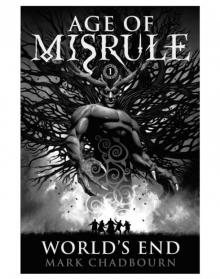 World's End (Age of Misrule, Book 1)
World's End (Age of Misrule, Book 1)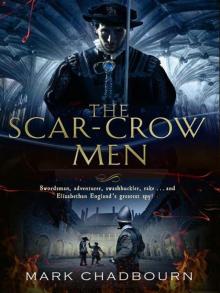 The Scar-Crow Men soa-2
The Scar-Crow Men soa-2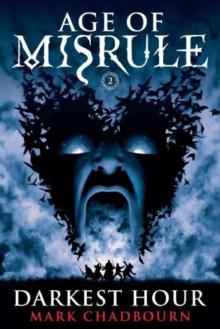 Darkest hour aom-2
Darkest hour aom-2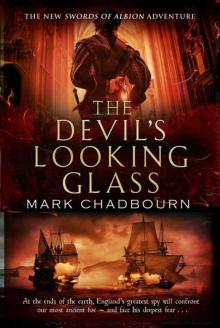 The Devil's Looking-Glass
The Devil's Looking-Glass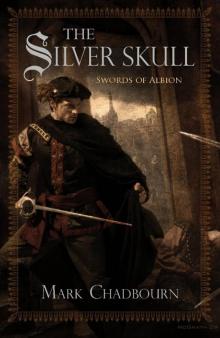 The Silver Skull
The Silver Skull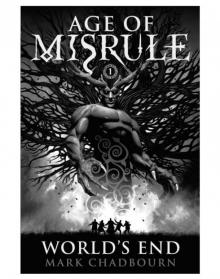 World's end taom-1
World's end taom-1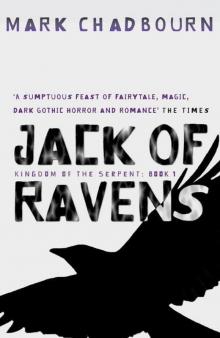 Jack of Ravens
Jack of Ravens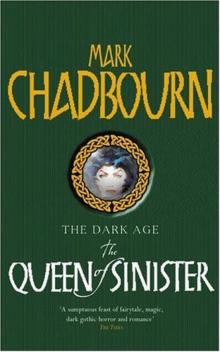 The Queen of Sinister
The Queen of Sinister